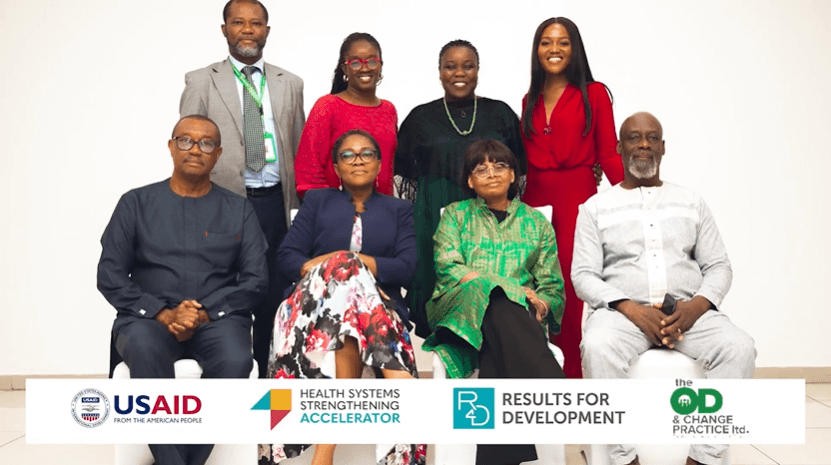New approaches to technical assistance for health systems strengthening
HSS Resource Menu
- How to Accelerate Health Systems Strengthening and Promote Health Equity
- Next Generation Technical Assistance
- Integrating Priority Health and Disease Programs
- Strengthening Primary Health Care and Community Health
- Designing Health Benefits Policies for UHC
- Incorporating Equity, Resilience, and Social and Behavioral Change
To catalyze sustainable, locally led health systems change, the Health Systems Strengthening Accelerator developed, tested and refined improved models of technical assistance. Three of these key models are:
- Co-Creation: New ways of involving a diverse range of country stakeholders in problem identification, priority setting and planning;
- Coaching and Mentoring: Local and regional experts providing support, advice and contextualized evidence; and
- Collaborative Learning: The facilitation of action-oriented knowledge exchange among policymakers and other health systems actors.
What is co-creation? And how can co-creation support health systems strengthening?
Co-creation is a participatory process to jointly define problems and design solutions in a way that supports local leaders and implementers and addresses power imbalances. It is a facilitated process that includes articulating a shared vision, seeking diverse stakeholder input, collaboratively designing solutions, as well as testing, reflection, learning, and iteration.
The Health Systems Strengthening Accelerator directly applied this approach in 12 countries to design interventions and co-produce research, new knowledge, and tools for health systems strengthening.
At a regional level in Asia, the Accelerator utilized co-creation to engage multiple stakeholders, including local public and private sector actors and a network of domestic health policy and systems research institutions (HPSRIs), in jointly developing health systems strengthening solutions that support and promote localization.
Co-Creation Applications in the Accelerator Countries
- Co-designed COVID-19 vaccination campaigns (Mauritania)
- Improved safe blood systems (Liberia, Malawi, Rwanda)
- Enhanced health insurance and UHC interventions (Benin, Ghana, Togo)
- Co-produced implementation research (Ghana, Guinea, Liberia, Nepal, and Philippines)
- Built a supportive ecosystem for Health Policy and System Research Institutions (Asia)
- Co-designed quality assurance and improvement tools for health facilities (Liberia)
- Co-developed governance and implementation plans for community and primary health programs (Cote d’Ivoire, Ghana, Nigeria, Tanzania)
Co-creation approaches can and should vary across contexts, and this requires a flexible approach. Preparatory work, such as targeted stakeholder outreach, is essential to lay the groundwork for trust and ongoing participation. While co-creation can be limited to one-time workshops, complex health systems strengthening challenges usually benefit from longer co-creation processes.
For example, in Ghana, we found that less intensive, rapid co-creation was effective for reviewing research results and collaboratively developing action plans. At the same time, longer-term engagements were needed to develop feasible and implementable guidelines for priority health sector initiatives. The co-creation processes produced impactful outputs that can inform policy and practice beyond the project’s life.
What is coaching and mentoring? And how can coaching and mentoring support health systems strengthening?
Coaching and mentoring (described in detail in The Coaching Approach) is an innovative model of technical assistance that elevates local expertise while also strengthening existing capacities.
The first unique feature of the coaching and mentoring approach is related to who provides the support. Coaches are typically country or regional experts, who may bring in global experts and other technical resources as needed.
The second key feature relates to how the support is provided. Coaches do not do the work directly, but rather stand side-by-side with country partners and provide advice and contextualized evidence along the way. Serving as a coach or mentor goes beyond being a typical consultant or a technical assistance provider. It’s a different way of working that requires strong skills in stakeholder engagement, process facilitation, knowledge translation and communication, in addition to technical expertise. This approach helps to avoid parallel processes, structures or institutions and builds local capacity.
As with all forms of technical assistance, coaching and mentoring must be tailored to fit the needs of the specific context. For example, in Benin, the Accelerator established a peer coaching mechanism among 21 pilot zones as they worked together to implement a new national health insurance program.
The Accelerator also provided coaching and mentoring at different levels of health systems, ranging from facility-level quality improvement teams in Liberia and civil society organizations in Togo, and to the Ministry of Health in Ghana.














